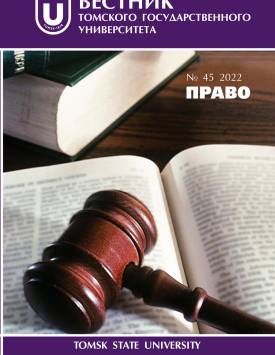Criminal case - transition from paper to digital format
In connection with the "covid" restrictions and the need to carry out criminal proceedings in the conditions of distances and restrictions, the problem of digitalization of criminal proceedings is relevant, part of which being the transformation of the investigation and consideration of criminal cases into a digital format. The purpose of this article is to distinguish between the issues that need to be solved at the level of technical support for the transition of criminal cases from paper to digital format and issues that are legal to ensure such a transition at the legislative level and creation of legal norms in criminal procedural legislation for the possibility of using electronic criminal cases in criminal proceedings. To achieve this goal, the authors use the methods of analysis and synthesis, observation and description to study the current state of readiness of criminal proceedings and criminal procedural legislation for the transition to the use of electronic criminal cases, means, methods and methods of introducing electronic criminal cases into judicial practice, positive aspects and difficulties that will be associated with this. It is noted that in addition to the concept of "criminal case" the judicial practice uses the concept of "materials of proceedings at the stage of execution of the sentence" and "materials of judicial proceedings on judicial control" the digitalization of which is also necessary. Scientific definitions of the concept of "criminal case" are analyzed and its own definition is proposed. Attention is drawn to the need to form the concept of electronic criminal case in criminal procedure legislation. Moreover, the authors propose to develop a list of the main issues that require legislative regulation: to settle signing procedural documents with an electronic digital signature or certifying the conversion of a document from paper to digital format with the signature of an official. The procedure for familiarization with the electronic criminal case and electronic materials of the accused, convict, victim, who are in conditions of deprivation or restriction of liberty also needs to be enshrined in law. The authors propose to do this in specially equipped premises, on specially designed devices in places of deprivation or restriction of liberty. A procedure for familiarizing oneself with material (substantive) evidence at the request of the accused is proposed. To identify the problems of introducing the use of electronic criminal cases and materials, developing an algorithm for the actions of participants in criminal proceedings, it is proposed to do this gradually, and start with the materials of the proceedings on judicial control - when the court chooses a preventive measure or the use of other measures of procedural coercion, when the court authorizes the production of individual investigative actions, as well as when considering materials considered by the court at the stage of execution of sentence. This will make it possible to develop a stable algorithm of actions for professional participants in criminal proceedings, and will contribute to a faster and better introduction of modern technologies into criminal proceedings. The authors declare no conflicts of interests.
Keywords
justice, criminal case, digitalization, electronic criminal case, preliminary investigation, court, prosecutor, investigator, lawyer, materials of criminal proceedingsAuthors
| Name | Organization | |
| Konin Vladimir V. | Russian State University of Justice | vkonin.kld@yandex.ru |
| Kudryavtseva Anna V. | Russian State University of Justice | acifna@mail.ru |
| Petrov Alexander V. | Russian State University of Justice |
References

Criminal case - transition from paper to digital format | Tomsk State University Journal of Law. 2022. № 45. DOI: 10.17223/22253513/45/6
